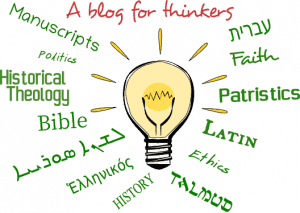charlesasullivan.com has a threefold mission for every reader that visits this site:
- To inspire people to go beyond the elementary principles of the Christian faith and focus on more complex issues
- To foster an appreciation of historic literature, cultures, languages, and the Bible
- To encourage others to learn ancient languages and master the art of the historical theology analytic process.
This site is intended for the advanced reader on topics relative to the Christian faith.
The focus is on comparative literature between Hebrew, Greek, Latin, and Aramaic sources. Other articles also dwell on christian mysticism, philosophy, and a few tidbits of ethics and politics from a faith perspective.
The website is designed that you can follow the conversation even if you do no know the languages. And if you want to learn an ancient language, there are many helps along the way to assist you in this journey.
The articles published here could not have happened without the help of Google, Microsoft, the Vatican and the many museums around the world bringing historic works into the digital sphere. Thank you to all of them.
The internet has brought on a revolution in digital humanities. We are in an epoch that the ancient sages would salivate over. Ancient manuscripts are only a few keystrokes away. What would take days or years to collate, or through the slow process of inter-library loan, or the old method of travelling by boat, air or car somewhere in the world to view a manuscript or a rare item (that is if you were granted viewing and that the cost was agreeable) are gone.
There are so many exciting things about working in an ancient language, a manuscript, or any literature in general. At one moment it is in the language or grammar that captivates. In another moment, it is admiring the creative writing or artwork of a manuscript. Often it is the theological or philosophical insight, or the message itself. Most of all, what I really want is to understand the meaning, and how it applies for today.
It is amazing how a good piece of literature, whether written 3,500 or 10 years ago, never seems old or outdated. A good story, whether it be fiction or non-fiction, never dies. They teach immortal life-lessons.
Reading ancient literature draws a portrait of the human psyche — the good parts, the bad, the innovations, the resistance to change, the humanity, inhumanity, truth, lies, strokes of genius, and demonstrations of sheer silliness. My fascination surrounds people writing about their personal and community identities. They are guideposts on where we fit in the great cosmic story and the continual struggle to survive. These narratives have been ongoing since the creation of man and it is interesting to see this unfold over almost 5000 years of literature.
This passion naturally connects me to the modern people of Israel, Palestine, and the Middle East. You may also see some contemporary political articles sneak in because of this.
The topics in the first four centuries AD demand the most interest because there is so much information to choose from.
Readership has been steadily growing and reader feedback has helped make this site even better. Thank you very much for your engagement.
